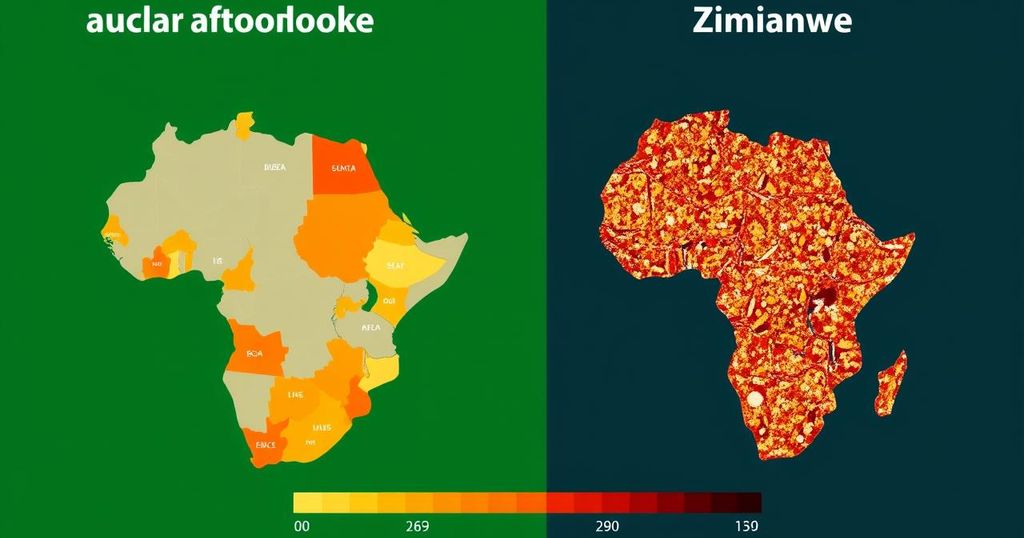A recent report indicates South Africa’s food security is significantly declining, with one in four poor households reporting child hunger. The country now has child stunting rates approaching that of Zimbabwe, and a quarter of households experience hunger, particularly in female-headed homes. The Food Security Index has dropped markedly, indicating deeper food insecurity prevalent since 2012. Economic pressures, including inflation and consumption of less nutritious food, compound the issue, necessitating reform in VAT policies to promote healthier food access.
A recent report from Stellenbosch University indicates a concerning decline in food security in South Africa, with statistics presenting a stark comparison to Zimbabwe. The report reveals that one in four of the nation’s poorest households reported children experiencing hunger in 2023. Since 2012, South Africa’s food security has continuously deteriorated, and alarming stunting rates now approach those of its economically disadvantaged neighbor, with South Africa at 25% compared to Zimbabwe’s 23.5%. Additionally, approximately 4.7 million South Africans do not meet their daily caloric requirements. The South African Food Security Index for 2024 exhibited a drop to 45.3, down from a peak of 64.9 in 2019—the lowest score recorded in the last decade. This downturn highlights that deeper levels of food insecurity affected more South Africans in 2023 than in previous years since 2012. Notably, households led by women face higher risks, with 16.7% of rural female-headed households reporting hunger compared to 12.5% in male-headed households. Consumption patterns have also altered, reflecting economic pressures. Approximately 11.8% of households indicated a reduced variety of food consumption since 2020, although initial declines in hunger rates had occurred due to enhanced social grants in the early 2000s. Despite some individual provinces, such as Limpopo, showing unexpected improvement in food security, others, including the Northern Cape, experienced significant declines. Gauteng and KwaZulu-Natal, initially faring better, also saw a reversal in food security levels leading up to 2023. Professor von Fintel, in a recent media briefing, emphasized that the economic ramifications of the Covid-19 pandemic, along with rising inflation rates, continue to challenge food security across the nation, compelling households to prioritize financial obligations at the expense of adequate nutrition. To address the paradox of affordability versus nutritional value in diets, particular emphasis is being placed on the need to promote foods that are both nutritious and cost-effective. Professor von Fintel suggests that certain healthy food items should be exempt from VAT to enhance accessibility for low-income families and subsequently improve health outcomes. The South African Poultry Association has voiced similar sentiments, advocating for VAT exemptions on specific chicken products, aiming to ease the financial burden on households and stimulate the poultry sector. Conversely, the Competition Commission has raised concerns regarding the pace at which retailers are adjusting their prices amidst easing cost pressures, calling for more expedient adjustments for consumers.
The issue of food security in South Africa presents a grave concern, especially given the country’s economic standing relative to its neighbors. Historical data reveals that South Africa initially made significant strides towards reducing hunger and improving food security, largely influenced by social grant implementations designed to support vulnerable populations. However, various factors have hindered sustained progress, including the repercussions of economic shocks such as the global financial crisis, recent pandemics, climatic changes, and conflict, which compound the difficulty of maintaining food access and affordability. The 2024 report provides critical insights into these ongoing challenges and underscores the urgent need for actionable interventions to avert further declines in food security throughout the country.
In summary, the current analysis sheds light on a troubling trajectory for food security in South Africa. With alarming hunger rates increasingly comparable to Zimbabwe, the findings call for immediate attention to economic factors affecting food availability and nutrition. The necessity for affordable and healthy food options, alongside calls for fiscal reform regarding VAT on nutritious food, highlights a pivotal approach towards alleviating food insecurity. Without proactive measures, the multidimensional challenges posed by inflation, unemployment, and other economic pressures may jeopardize the health and welfare of millions of South Africans in the coming decade.
Original Source: www.dailymaverick.co.za






